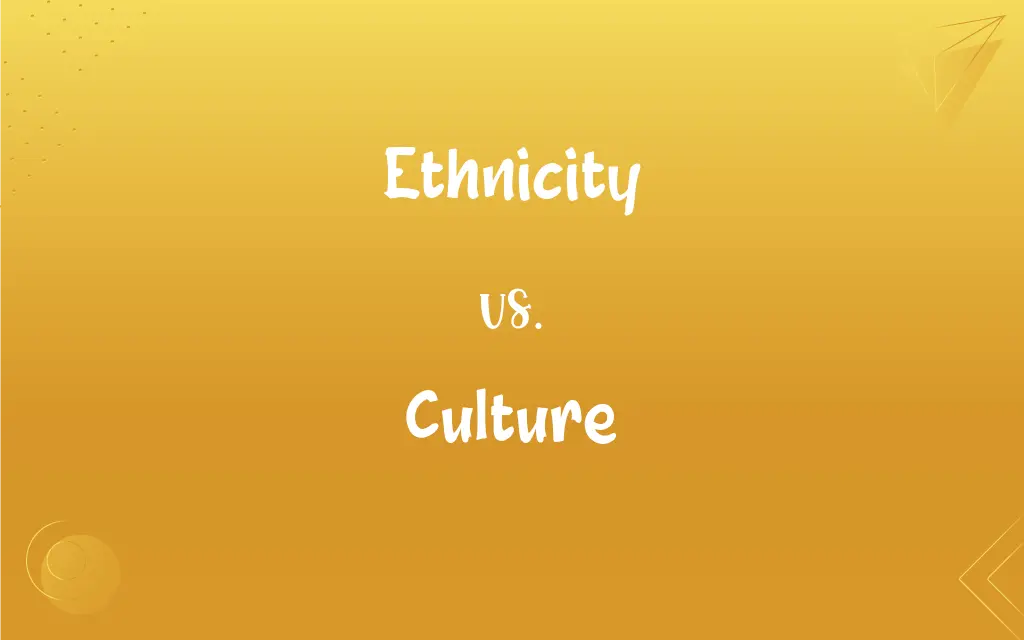Ethnicity vs. Culture: What's the Difference?
Edited by Janet White || By Harlon Moss || Updated on October 25, 2023
Ethnicity refers to shared genetic and biological traits; culture encompasses shared beliefs, customs, and practices.

Key Differences
Ethnicity is rooted in shared genetic, biological, and ancestral traits that group people together. People within the same ethnic group often share a common lineage. Culture, on the other hand, is a shared system of beliefs, customs, practices, and behaviors that people learn and adopt as part of a community.
Ethnicity tends to be inherited and is often tied to physical attributes and geographic origins. Individuals don't choose their ethnicity; they are born into it. Culture, in contrast, is dynamic and can be adapted, changed, and learned over time. It is influenced by history, environment, and collective experiences.
Both ethnicity and culture play significant roles in shaping an individual's identity. However, while ethnicity is more fixed and rooted in biology and ancestry, culture is fluid, encompassing everything from language and religion to cuisine and arts. It's possible for someone to belong to one ethnic group but adopt the culture of another.
In multicultural societies, it's common to find a mosaic of cultures representing various ethnic groups. Culture evolves with societal changes and influences, and individuals can embrace multiple cultures throughout their lives. Ethnicity, however, remains a more stable identifier, often with deep historical and familial ties.
Ethnicity and culture, while distinct, often intertwine. For instance, certain cultural practices may originate from the traditions of a specific ethnic group. However, as societies intermingle, cultures blend, evolve, and adapt, often becoming distinct from their original ethnic roots.
ADVERTISEMENT
Comparison Chart
Definition
Relates to genetic, biological, and ancestral traits.
Refers to shared beliefs, customs, practices, and behaviors.
Changeability
Largely static and inherited.
Dynamic and can evolve over time.
Origin
Often tied to geography and lineage.
Influenced by history, environment, and collective experiences.
Choice
Individuals are born into an ethnicity.
Culture can be adopted, learned, and changed.
Influence on Identity
More fixed identifier, rooted in biology and ancestry.
Fluid, can encompass language, religion, cuisine, and arts.
ADVERTISEMENT
Ethnicity and Culture Definitions
Ethnicity
Ethnicity often pertains to a group's common lineage or ancestry.
Their shared ethnicity is evident in family histories.
Culture
Culture is learned and passed down through generations.
Through stories and songs, the elders preserved the culture for the youth.
Ethnicity
Ethnicity is a group's shared genetic and biological traits.
Her ethnicity traces back to indigenous tribes of the region.
Culture
Culture can evolve and adapt over time.
With globalization, many aspects of the culture have modernized.
Ethnicity
Ethnicity is an inherited trait based on ancestral backgrounds.
Despite growing up in different countries, they shared the same ethnicity.
Culture
Culture is a system of shared beliefs, values, and practices.
The culture of Japan is rich in tradition and ritual.
Ethnicity
Ethnicity often involves common physical attributes among its members.
Their distinct facial features spoke of their shared ethnicity.
Culture
Culture encompasses arts, language, and societal norms.
French culture is known for its emphasis on art and cuisine.
Ethnicity
Ethnicity can be associated with specific geographic regions.
His ethnicity is linked to the mountainous regions of Nepal.
Culture
Culture influences how individuals perceive the world.
Through his culture, he learned the importance of community and family.
Ethnicity
Ethnic character, background, or affiliation.
Culture
The arts, beliefs, customs, institutions, and other products of human work and thought considered as a unit, especially with regard to a particular time or social group
Edwardian culture.
Japanese culture.
FAQs
Is language a part of ethnicity or culture?
Language is a component of culture, but certain languages can be associated with specific ethnicities.
How do migration and globalization impact culture?
They can introduce, blend, or modify cultural practices, leading to cultural evolution.
Can culture change within an ethnic group?
Yes, culture is dynamic and can evolve, even within a specific ethnic group.
How does education play a role in culture?
Education can transmit, preserve, or modify cultural values and practices.
Can one's name indicate their ethnicity or culture?
Names can sometimes hint at one's ethnicity or cultural background, but it's not always definitive.
Why is understanding the difference between ethnicity and culture important?
It fosters better communication, understanding, and appreciation of diversity in societies.
Is it possible for culture to influence one's ethnicity?
No, ethnicity is based on genetic and ancestral factors and isn't influenced by cultural practices.
What's the primary distinction between ethnicity and culture?
Ethnicity refers to genetic and ancestral traits, while culture relates to shared beliefs and practices.
Can someone belong to one ethnicity but adopt another's culture?
Absolutely, individuals can adopt and be influenced by multiple cultures regardless of their ethnicity.
Can ethnicity influence cultural practices?
Yes, many cultural practices can have roots in the traditions of specific ethnic groups.
Is religion a part of culture or ethnicity?
Religion is a component of culture, but certain religions can be associated with specific ethnic groups.
How do festivals relate to culture and ethnicity?
Festivals are cultural expressions and can originate from or celebrate the traditions of specific ethnic groups.
In modern societies, is it common to find blended cultures?
Yes, multicultural societies often see a blending of various cultural practices and values.
Can someone change their culture?
Yes, individuals can learn, adopt, and even blend different cultures throughout their life.
How do traditions fit into the concept of culture and ethnicity?
Traditions are aspects of culture and can originate from the practices of specific ethnic groups.
Can two people from different ethnicities share a culture?
Absolutely, culture is adaptable, and individuals from different ethnicities can share or adopt similar cultural practices.
How are ethnicity and culture represented in literature and media?
They are often portrayed to highlight diversity, identity, and societal dynamics, but can sometimes be stereotyped.
Can cultural practices evolve faster than changes in ethnicity?
Yes, culture is dynamic and can change rapidly, while ethnicity remains relatively constant.
Is ethnicity always visible in physical features?
Often, but not always. Ethnicity can influence physical traits, but there's significant diversity within ethnic groups.
Are all members of an ethnic group bound to have the same culture?
No, while ethnicity might influence culture, individuals within an ethnic group can have varied cultural experiences.
About Author
Written by
Harlon MossHarlon is a seasoned quality moderator and accomplished content writer for Difference Wiki. An alumnus of the prestigious University of California, he earned his degree in Computer Science. Leveraging his academic background, Harlon brings a meticulous and informed perspective to his work, ensuring content accuracy and excellence.
Edited by
Janet WhiteJanet White has been an esteemed writer and blogger for Difference Wiki. Holding a Master's degree in Science and Medical Journalism from the prestigious Boston University, she has consistently demonstrated her expertise and passion for her field. When she's not immersed in her work, Janet relishes her time exercising, delving into a good book, and cherishing moments with friends and family.































































